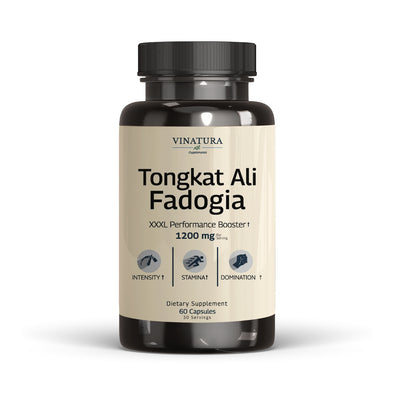
Should You Take Tongkat Ali With or Without Food?
Tongkat Ali can be used with or without food. There is no specific documentation suggesting that taking it on an empty stomach or with food is better. However, using Tongkat Ali with food is believed to provide better absorption while taking it on an empty stomach can help avoid stomach upset.
Should you take Tongkat Ali with or without food? The answer will be addressed in this article.
Before exploring further, please read the disclaimer located at the end of this webpage.
Key Takeaways
- Using Tongkat Ali on an empty stomach can help avoid upset stomach.
- Tongkat Ali can be taken with food or mixed with cereal, smoothies, or coffee to reduce its characteristic bitterness.
- It's advisable to avoid alcohol when using Tongkat Ali.
- The optimal duration of Tongkat Ali usage depends on various factors and individual needs.
Should You Take Tongkat Ali With or Without Food?
You can take Tongkat Ali with or without food depending on your needs and Tongkat Ali's forms.
Tongkat Ali supplement is available in two common forms: capsules and powder. When purchasing, you have the option to choose the format that suits you best.
If you opt for the powder, it can be consumed with water, blended into smoothies, or mixed with fruit to mask its bitter taste and enhance its flavor.
Consuming Tongkat Ali on an empty stomach can avoid stomach upset and enhance nutrient absorption. The body tends to absorb Tongkat Ali more effectively when taken on an empty stomach.
Alternatively, you may have a light snack before consuming it, but it is recommended to wait for approximately an hour before commencing its use.

How Much Tongkat Ali Be Consumed?
A study conducted in 2016 found that rats showed no changes in liver or kidney function when administered 200 mg/kg of Tongkat Ali as an alcoholic extract or 300 mg/kg as an aqueous form [1].
However, further research revealed that the use of higher doses, such as 1,500-2,000 mg/kg for alcohol-based tongkat ali extract and over 3,000 mg/kg for water-based extract, resulted in the death of mice.
More recently, a study involving 109 men aged between 30 and 50 demonstrated the safety of using 300 mg of tongkat ali extract daily for 12 weeks, with no adverse health effects observed. [2]
Therefore, the safe dosage when using Tongkat Ali is between 200-400 mg per day.
Also read: How To Take Tongkat Ali? Recommended Timing, Dosage and Form
Can You Take Tongkat Ali With Food?
To prevent potential stomach upset, Tongkat Ali can also be consumed on an empty stomach. While taking Tongkat Ali with food is ideal for optimal absorption, it's important to consider that certain foods and beverages can impact its effectiveness.
For example, it is advisable to avoid consuming alcohol while taking Tongkat Ali, as it may hinder absorption in the body. Additionally, it's worth noting that foods high in fat or fiber have the potential to impede the herb's absorption.
To maximize the effectiveness of Tongkat Ali, it is recommended to seek guidance from an expert, especially if you are currently taking medications or have any pre-existing medical conditions.
After consulting with a professional, you can determine the best time for taking Tongkat Ali to ensure maximum comfort in its usage.
However, the timing of Tongkat Ali consumption can vary based on individual preferences and goals. Some individuals prefer taking it in the morning to energize their day, while others may question its suitability for nighttime use.
There are no strict regulations regarding taking Tongkat Ali before going to sleep.
It is important to note that the effects of Tongkat Ali on children, pregnant women, and breastfeeding women have not been thoroughly studied. Therefore, it is advised to avoid using Tongkat Ali in these cases.

How Long Does It Take For Tongkat Ali Effects?
While some individuals may notice a difference within a few weeks, others may require more time to experience its effects.
The effects of Tongkat Ali may vary for each individual due to differences in physical condition, lifestyle, and personal preferences.
To maximize the benefits of Tongkat Ali, it is important to maintain a consistent and regular usage schedule.
If you have any concerns or questions regarding the use of Tongkat Ali, it is recommended to consult with a medical professional for accurate and safe advice.
They can provide personalized information based on your specific health situation and individual needs.
It is crucial to adhere to the recommended dosage and avoid exceeding it without professional supervision.
This will ensure that the use of Tongkat Ali is both safe and effective for each individual.
Explore more: How Long Before Tongkat Ali Starts To Work? Other FAQs
Frequently Asked Questions
Can I Take Tongkat Ali Before Bed?
You can use Tongkat Ali before sleep. Enhancing testosterone levels through Tongkat Ali while sleeping has multiple benefits. However, consider taking a suitable Tongkat Ali before bed to avoid insomnia.
What Is The Best Time To Take Tongkat Ali?
The best time to use Tongkat Ali depends on individual factors like body condition, lifestyle, and preferences. Some find it beneficial to take it in the morning for increased energy and physical performance. Others prefer it in the evening for relaxation and better sleep. Consider body composition, exercise habits, and personal goals.
Can I Take Tongkat Ali Every Day?
Tongkat Ali can be incorporated into your daily routine to help you achieve your health goals. Extensive research has shown that long-term use of Tongkat Ali does not have any adverse effects on your health.
Can I Use Tongkat Ali With Coffee?
Tongkat Ali can indeed be combined with coffee. For centuries, Tongkat Ali coffee has been savored as a delightful and distinctive beverage, cherished for its captivating aroma and invigorating flavor.
Conclusion
In conclusion, the choice of “Should you take Tongkat Ali on an empty stomach or with food ultimately comes down to personal preference.
Each approach offers its advantages, so it is wise to consult healthcare professionals for expert advice and guidance.
It's important to remember that consistent and regular use of Tongkat Ali will greatly enhance its benefits.
References
- [1] Shaheed Ur Rehman, Kevin Kyungsik Choe, Hye Hyun Yoo. Review on Traditional Herbal Medicine, Eurycoma longifolia Jack (Tongkat Ali): Its Traditional Uses, Chemistry, Evidence-Based Pharmacology and Toxicology. Molecules. 2016;21(3):331-331. doi:https://doi.org/10.3390/molecules21030331
- [2] Ismail R, Mohd W, George A, Hussain N, Kamal M, Liske E. Randomized Clinical Trial on the Use of PHYSTA Freeze-Dried Water Extract of Eurycoma longifolia for the Improvement of Quality of Life and Sexual Well-Being in Men. Evidence-based Complementary and Alternative Medicine. 2012;2012:1-10. doi:https://doi.org/10.1155/2012/429268.
Author

Product Disclaimer
The dietary supplement products mentioned on this website are formulated based on scientific research and adhere to FDA guidelines for dietary supplements. However, the content of the articles has not been evaluated by the Food and Drug Administration (FDA) and is not intended to promote or endorse any specific product. Any products sold on this website are not intended to diagnose, treat, cure, or prevent any disease.
Opinions and Endorsements
Any claims, statements, or opinions expressed in the articles are those of the author(s) and do not necessarily reflect the views or opinions of the manufacturers of the dietary supplement products. The products sold on this website are separate from the content of the articles and are not directly endorsed or associated with the information presented here.
Liability Disclaimer
The author(s) of the articles, website, and manufacturers of the dietary supplement products do not assume any liability for any potential consequences arising from the use of the information provided in the articles. It is recommended that individuals consult with a qualified healthcare professional before making any dietary or lifestyle changes, including the use of dietary supplements.
Product Usage
Please refer to the product labels and packaging for specific usage instructions and guidelines for the dietary supplement products sold on this website.
Customer Support
For any concerns or questions regarding the dietary supplement products, please contact our customer support team, who will be more than happy to assist you.






Leave a Comment
Be the first to comment.
What do you think?